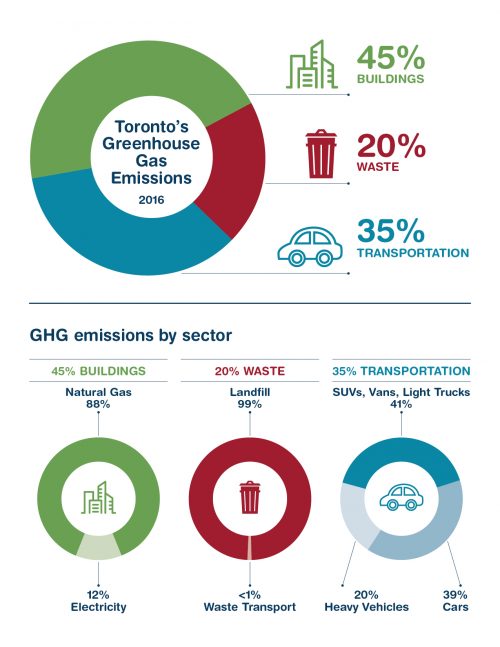The Great Carbon Debate: Are Condos Better for The Environment Than Houses?
 Written By Sam Massoudi
Written By Sam Massoudi Full disclosure — as someone who specializes in condos, I have a horse in this race. For years, I’ve watched people reluctantly enter the condo market, having abandoned their dreams of owning a large house with a big backyard. It always struck me how these clients had no idea how much of a positive impact this choice would have on the environment… and frankly at the time, I didn't know either.
People typically associate pollution with congested traffic, high-density neighbourhoods, eating meat (more recently) and the downtown core in general, but is that assessment accurate? And does the average weekend warrior in Liberty Village leave the same footprint as a commuting professional in the suburbs?
I wish I could say that I’m a realtor by day and a climate scientist by night, but I’m forced to rely on the information that’s available. What I found were two independent studies that suggested a correlation between where someone lived and their carbon footprint.
What the data shows
My search led me to a 2010 paper by Lorraine Sugar and Dan Hoornweg on Greenhouse Gas Emissions in Toronto, which established a link between where people lived and their emission of greenhouse gases. The paper cited Whitby as having the worst per capita consumption in the Metropolitan Toronto area with 13.02 tonnes per capita (carbon dioxide emissions per person).
This clearly contrasts with an area like East York, which is removed from the downtown core but has a relatively large supply of apartment complexes, resulting in just 1.31 tonnes per capita. While public transit likely accounts for a lower carbon footprint in East York, this fact also implies that the type of dwelling is also playing a role.
These conclusions aren’t limited to Toronto — or Canada for that matter — supporting evidence can be found in a UC Berkeley study in 2013 which yielded similar results in the US: large urban areas typically have low emissions per person, while the suburbs surrounding those areas often have substantially higher emissions. UC Berkeley’s CoolClimate Map illustrates this point by mapping the greenhouse gases for the whole of the United States.
In both cases, transportation and heating were identified as the major causes of higher emissions. While this provides excellent guidance for how to reduce greenhouse gases, it doesn’t address one burning question: Would a condo resident in the suburbs (requiring a commute to work) have the same impact on the environment as someone living in a detached home in the suburbs?

Are Condos Better for the Environment than Houses?
There are very few careers that will get you invited into a person’s home on a regular basis — real estate is one of them. I’ve had plenty of opportunities to see the difference between living arrangements for condo residents and those with a detached house, and it’s obvious to me that people who live in large houses have a substantially larger carbon footprint than condo residents. And not just due to just the inevitable commute to work.
A detached house in the suburbs comes with a larger layout than your average downtown Toronto condo; often featuring a longer and linear floor plan in most modern buildings.
From my experience, buyers don’t purchase large houses for empty rooms. Whether it’s a home gym or a media centre, people find uses for open space, and those uses often lead to additional electronics. More space means more energy — light, heat, and all the toys that come with it. But it's not just what’s inside the home, it’s also the exterior lighting, home security systems and landscaping.
These conclusions are supported by data — a 2007 Statistics Canada survey clearly demonstrates a trend of increasing consumption corresponding to increased square footage. 2007 Statistics Canada: Energy Use Inside and Outside
Going forward, rising housing prices will ensure that more buyers in the GTA spill over into the condo market. However, some of these buyers will land in ageing condo buildings from the 70s and 80s. So how does the government plan to address these issues? And what will be done to ensure that older condo buildings are energy efficient?
TransformTO
Diverging from the two studies presented — a 2016 Toronto Greenhouse Gas Emissions Inventory reported buildings as the largest emission polluters, ahead of transportation; however, these figures included industry.

TransformTO plans to reduce greenhouse gas emissions by 80% by 2050, based on 1990 levels. The strategy covers an array of issues, but I wanted to focus on how this will address emissions relating to housing. TransformTo will attempt to do this by:
· Ensuring that all new buildings emit zero greenhouse gases by 2030
· Retrofit all existing buildings by 2050 in order to reduce emissions by 40 percent.
The Takeaway
TransformTO will bring much-needed action to help address building emissions, but these changes will do little to curb the emissions from large suburban homes, as this responsibility will ultimately be that of the homeowners.
Nobody wants to spend their days thinking about how to reduce their carbon footprint — especially not when it means cutting back on the things we enjoy. But there’s one easy way to reduce your impact on the planet and it doesn’t require you to stop binging your favourite show: consider the benefits to high-density living.
Citations
· Statistics Canada, 2007 Survey of Household Energy Use – Supplemental Report
· Christopher M. Jones and Daniel M. Kammen, Spatial Distribution of U.S. Household Carbon Footprints Reveals Suburbanization Undermines Greenhouse Gas Benefits of Urban Population Density. Environ. Sci. Technol., 2013, dx.doi.org/10.1021/es4034364
· Daniel Hoornweg, Lorraine Sugar, Claudia Lorena Trejos Gómez; Cities and greenhouse gas emissions: moving forward.
· https://coolclimate.org/maps
Starting your search for a new home? Click on any of these links to access active listings, sold listings or contact a Strata agent.
For any questions about this article or media inquires, please email media@strata.ca
